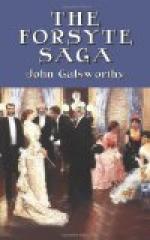But this long tale is no scientific study of a period; it is rather an intimate incarnation of the disturbance that Beauty effects in the lives of men.
The figure of Irene, never, as the reader may possibly have observed, present, except through the senses of other characters, is a concretion of disturbing Beauty impinging on a possessive world.
One has noticed that readers, as they wade on through the salt waters of the Saga, are inclined more and more to pity Soames, and to think that in doing so they are in revolt against the mood of his creator. Far from it! He, too, pities Soames, the tragedy of whose life is the very simple, uncontrollable tragedy of being unlovable, without quite a thick enough skin to be thoroughly unconscious of the fact. Not even Fleur loves Soames as he feels he ought to be loved. But in pitying Soames, readers incline, perhaps, to animus against Irene: After all, they think, he wasn’t a bad fellow, it wasn’t his fault; she ought to have forgiven him, and so on!
And, taking sides, they lose perception of the simple truth, which underlies the whole story, that where sex attraction is utterly and definitely lacking in one partner to a union, no amount of pity, or reason, or duty, or what not, can overcome a repulsion implicit in Nature. Whether it ought to, or no, is beside the point; because in fact it never does. And where Irene seems hard and cruel, as in the Bois de Boulogne, or the Goupenor Gallery, she is but wisely realistic—knowing that the least concession is the inch which precedes the impossible, the repulsive ell.
A criticism one might pass on the last phase of the Saga is the complaint that Irene and Jolyon those rebels against property—claim spiritual property in their son Jon. But it would be hypercriticism, as the tale is told. No father and mother could have let the boy marry Fleur without knowledge of the facts; and the facts determine Jon, not the persuasion of his parents. Moreover, Jolyon’s persuasion is not on his own account, but on Irene’s, and Irene’s persuasion becomes a reiterated: “Don’t think of me, think of yourself!” That Jon, knowing the facts, can realise his mother’s feelings, will hardly with justice be held proof that she is, after all, a Forsyte.




